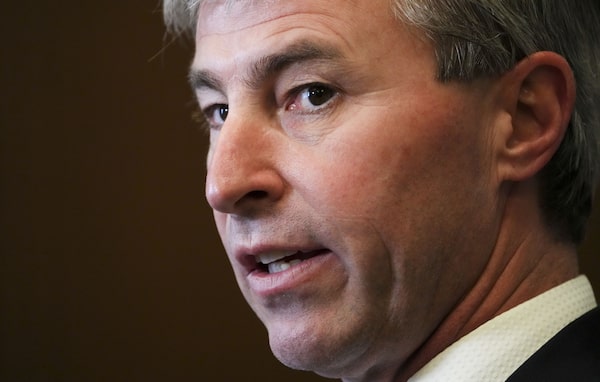
Nova Scotia Premier Tim Houston says access to 'quality, affordable child care' will help address child poverty and support parents looking to get back into the work force.Sean Kilpatrick/The Canadian Press
Child-care fees in Nova Scotia will drop by an average of 25 per cent, retroactive to Jan. 1, which is ahead of schedule under the agreement signed last summer between the province and the federal government.
The early cut in fees will save parents an average of $200 a month for a toddler in care, Prime Minister Justin Trudeau and Premier Tim Houston said during a virtual news conference on Friday.
In July, Nova Scotia became the second province to sign onto the federal Liberals’ early learning and child-care agreement, the goal of which is to gradually lower the cost of child care to $10 a day on average by 2026. It is also supposed to cut fees by an average of 50 per cent in Nova Scotia by the end of 2022.
Houston told reporters the two governments felt an “urgency” to cut fees more quickly for Nova Scotians.
“We understand the importance of having affordable, accessible child care; it’s impossible to overstate it,” Houston said.
“We’re on the right path and we felt the urgency to go quicker, to support families quicker.”
Trudeau and Houston said parents and caregivers will pay their current rate until April 1, when they’ll receive a cheque from their child-care providers for the cost reduction from January to March, or receive a credit.
Parents can expect a further drop in fees closer to the end of the year, when the full 50 per cent reduction will go into effect, Houston said.
The prime minister said his government had been planning to cut child-care costs for years, adding that the COVID-19 pandemic highlighted the importance of subsidizing the service for Canadians.
“Having kids underfoot when (they’re) trying to work virtually was the thing that put it over the line for many people,” Trudeau said.
Houston echoed that sentiment, adding that access to “quality, affordable child care” will help address child poverty and support parents looking to get back into the work force.
“At a time when we’re seeing our province and population soar and continue to grow we’re also seeing some labour gaps,” Houston said. “So we need all hands on deck working to build up Nova Scotia.”
Trudeau and Houston said the agreement would create 1,500 new not-for-profit child-care spaces this fall, for a total of 9,500 new spaces by March 2026.
CUPE Nova Scotia president Nan McFadgen said Friday in a statement that the announcement was a good first step for children and early childhood educators in the province. CUPE member Naomi Stewart, the union’s child-care sector co-ordinator, said there is still work to be done to improve working conditions and wages for employees in the field.
“Early childhood educators need the government to work as hard for them as they have for parents Our members are overworked and tired, and don’t receive enough compensation for the important work they do,” Stewart said in a statement.
The federal government has signed deals with every province except Ontario to bring down the cost of child care for children under six years old, over a five-year period.
Our Morning Update and Evening Update newsletters are written by Globe editors, giving you a concise summary of the day’s most important headlines. Sign up today.